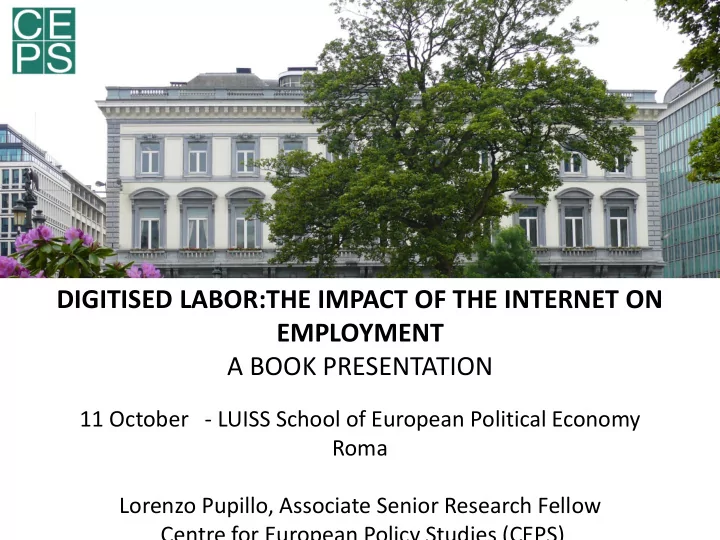

DIGITISED LABOR:THE IMPACT OF THE INTERNET ON EMPLOYMENT A BOOK PRESENTATION 11 October - LUISS School of European Political Economy Roma Lorenzo Pupillo, Associate Senior Research Fellow @CEPS_thinktank Centre for European Policy Studies (CEPS)
3 Main Messages • All the empirical contributions indicate that the internet has a positive impact on employment, but it is not clear if more jobs are created than destroyed . • While internet is creating opportunities for many, it is also accompanied by ambigous trends (routinization , job market polarization, income inequality) that by themselves will not generate a more resilient and inclusive labor market • Strong Policy actions from the government and the private sector are necessary to avoid to loose the benefit from the ICT revolution
4 NEW QUANTITATIVE EVIDENCE • Job displacement is a short term issue • Routinization: not only unskilled workers but also routine jobs • Broadband Internet connectivity and employment • Modeling employment from the bottom – up • Robotization and well-being • Internet in the media and entertainment sector
THE CHANGE IS COMING • WILL IT BE DIFFERENT FROM OTHER REVOLUTIONS ? • TWO DIMENSIONS make it reasonable to think that this wave of thecnological disruption could be different • TIME • SCALE
How to manage the change: not as busines as usual! • The speed and the scale of changes induced by the digital revolution require new education and labour market adjustment policies that facilitate structural and social adjustment without slowing innovation. • Failing to mitigate “short - term” job losses risks a policy response to reduce both the speed and the extent of the ICT revolution
CRITICAL ISSUES • COMPLEMENTARITY BETWEEN HUMANS AND MACHINES • NEW SET OF SKILLS THAT ALLOW WORKING ALONGSIDE THE SMART NEW MACHINES
Complementarity between humans and machines • Polanyi’s paradox: Hungarian scientist and philosopher Michael Polanyi who in 1966 observed: “ We can know more than we can tell …The skill of a driver cannot be replaced by a thorough schooling in the theory of a motorcar; the knowledge I have of my own body differs altogether from the knowledge of its physiology. • Tacit Knowledge and explicit knowledge
AI & Polanyi’s paradox • For how long thus will the Polanyi’s paradox hold? According to a recent book by McAfee & Bryjolsson (2017), “ computers still don’t really understand the human condition […]and digital technologies do a poor job of satisfying most of our social drives. So, work that taps into these drives will likely continue to be done by people for some time to come. Such work includes tasks that require empathy, leadership, teamwork, and coaching.”
CRITICAL ISSUES • NEW SET OF SKILLS THAT ALLOW WORKING ALONGSIDE THE SMART NEW MACHINES • Moving from STEM (science, technology, engineering and mathematics) to STEAM (adding arts to the mix) would be a right step in this direction. Furthermore, soft skills such as leadership, team-building and creativity will become increasingly important and are less likely to be automated.
The world of Centaurs ! • Thus, the future of work could be seen not in its replacement or displacement by technology but in the complementarity between humans and machines. Smarter machines and smarter people can complement each other to create a mass of customised products.
13 @CEPS_ThinkTank Thank You! info@ceps.eu 1 Place du Congres, 1000 Brussels Tel: (+32 2)229 39 11
Recommend
More recommend